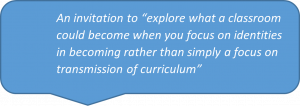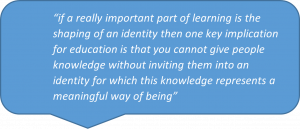Story of simulation – using simulation to enhance practice based learning opportunities
 Emma is a Senior Clinical Lecturer in the School of Health Sciences. She has worked for many years in the NHS and has taught at the University of Manchester for over 10 years.
Emma is a Senior Clinical Lecturer in the School of Health Sciences. She has worked for many years in the NHS and has taught at the University of Manchester for over 10 years.
Emma’s area of interest is simulated clinical learning, with a particular focus on the interplay between innovative pedagogy design and the development of practical skills whilst building student’s confidence & reducing anxiety in a safe and supported learning environment.
I have always been interested in people. During my years working as a Speech & Language Therapist and as a Clinical Lecturer, the thing that has knitted my two roles together is it is all about working with people! Supporting them to learn, and develop and be the best they can be, albeit in very different contexts and circumstances.
In 2017, I was fortunate to work on a small project around increasing placement capacity. Simulation kept popping up during my literature search. Intrigued, I was keen to learn more and was successful in gaining funds from UoM Investing in Success programme. This enabled me to travel to the University of Queensland to observe simulation in practice, to find out more about the use of simulation in Speech & Language Therapy and to meet people working in this area.
Since then I have been developing my interest and knowledge in simulation is as a teaching methodology. For me, I think it has particular benefits in helping students to practice and prepare. Providing a safe space for students to make mistakes, learn and work as groups. Simulation by definition offers a safe place to learn, that simulates real life where the focus in on the learner.
Over the years of observing, facilitating and finding out more about simulation, I am intrigued by the many benefits of simulation. These include exposure to specific clinical specialisms and experiences that may not be available in a workplace placement. Also the benefits in increasing learner confidence and reducing anxiety.
There are numerous learning theories underpinning simulation – (if you want to find out more about simulation look at this e-learning resource)
However, the following two quotes from Etienne Wenger’s work on social learning theory have been a bit of driving force over the last few years…


I am curious to explore the benefits of simulation, particularly around developing the learner: to consider how we provide the optimal foundations for the learner to thrive.
I feel simulation has real benefits when used as part of a continuum of learning

To help students build their identities and develop and enhance their capabilities.
On our BSc SLT at UoM we have sourced real clinical cases for our simulations – the scenarios mirror the clinical process and provide exposure to various clinical skills including clinical communication skills, clinical reasoning and clinical admin.
We use a mix of video data, written case notes and simulated patients across the 3 years of the programme.
Students have valued simulation and the chance to practice and prepare. They particularly value the recent addition of having local clinicians facilitate simulations. This partnership working has many benefits including closer relationships with local SLT services and sharing good practice around supporting students.
All of our simulations are facilitated in small groups. I am really keen to ensure these are psychologically safe learning spaces for the learner – that doesn’t mean that we make things easy or comfortable – just that we support and encourage individual members of the group to feel seen and heard and that their contribution is valued. Errors and mistakes are valued as part of the normal learning process and students are encouraged and supported to learn as groups.
Related to this psychologically safe learning space, the facilitator has been identified by students as being the key to the success of simulation.
So what makes a good facilitator? If you can teach you can facilitate? What’s the difference?
It turns out there is a big difference. Facilitation requires a specific set of skills, where the focus is on the supporting the individual learner to grow and develop, rather than transmitting information and sharing expertise
Facilitators that worked well were able to create and maintain psychologically safe learning spaces, role modelled excellent interpersonal skills, team working and leadership.
Here are my top 3 things to consider when using simulation
- Be clear on your ILOs – what do you want students to learn by the end of the simulation? Is it clear to the facilitators and the students?
- Facilitator skill – Invest in time to train your facilitators – supporting them to focus on core facilitator skills of coaching and education relationship building/ role modelling and encouraging self- regulated learners.
- Group size – what is manageable for the facilitator? Too big or too small can affect the equilibrium of the group from both the facilitator and student perspective
References
- Farnworth V, Kleanthous I & Wenger-Trayner E (2016) Communities of Practice as a Social Theory of Learning: a Conversation with Etienne Wenger, British Journal of Educational Studies, 64:2, 139-160 – https://www.speechpathologyaustralia.org.au/SPAweb/Resources_For_Speech_Pathologists/Simulation-based_Learning_Program/
- Emma’s ITL Fellowship Project Report
- Simulation Rise Resource, by Emma Ormerod
- Simulation in Teaching ITL Fellowship Podcast







0 Comments